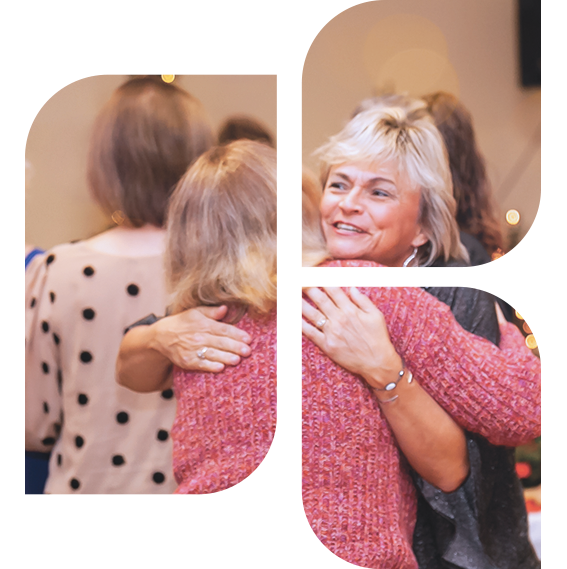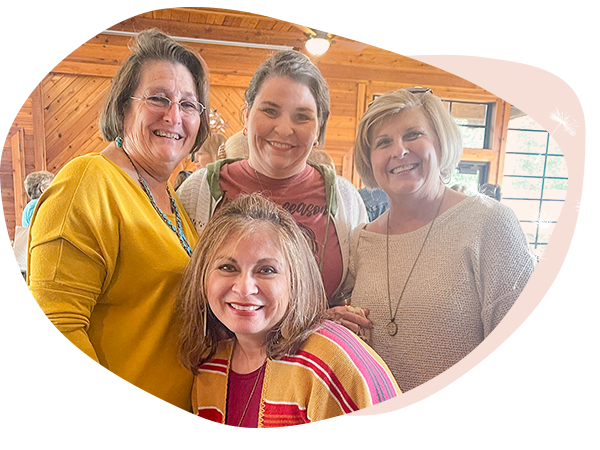— How you can help
Friends, Family & Church.
Family members, friends, and the church play a vital role in a widow’s life. The positive impact these groups can have on the life of a widow cannot be overstated. Understand that her world has turned upside down by the loss of her husband. Widows are often lost in the moment and unable to acknowledge all that is happening around them. Each person grieves differently, so continue to reach out to her and seek to love her right where she is.
HOPE. GRACE. JOY

Friends & Family —Understand the widow you know and love.
It’s very difficult for a widow to ask for help on her own – be her advocate.
The widow’s world has turned upside down by the loss of her husband. His death also results in the loss of hopes and dreams for the future.
A widow is faced with having to create a new identity for herself – she cannot go back to being the same person she was before.
The widow does not need to be “fixed” – she needs to be loved right where she is.
The widow’s family and friends are often unable to provide the help she needs – don’t be afraid to seek outside help.
Remember the widow’s family members have also suffered loss. Each person grieves differently. This may affect how they relate and respond to the widow they love.
Grief-induced stress may cause personality changes such as anger, negativism, complaining, and other difficult expressions. Be assured, these changes will pass with time. Your proactive unconditional love, and involvement in her daily life, will help the process along.
Widows typically lose 75% of their closest friends within one year of their husband’s death. It is critical to help her connect with others who truly understand what she is experiencing.
Widows are often lost in the moment and unable to acknowledge all that is happening around them. She may be unable to say “thank you” or give positive feedback in the moment – don’t let this discourage you. Continue to reach out to her.
Churches —Understand the widow in your congregation.
- The positive impact the church can have on the life of a widow cannot be overstated. Likewise, failure of the church to help will multiply her pain and leave lasting scars.
- The church should work in concert with the widow’s family and existing support network – giving precedence to the family, unless it is determined that her needs aren’t being met. If this happens, the church should clearly communicate her needs to the family, and invite them to be part of the helping process.
- Church friends should make an extra effort to stay in touch with her, and spend time with her. Invitations should continue indefinitely, even if she has turned them down in the past.
- It is often difficult for a widow to go to church alone – friends should invite her to attend with them.
- Frequent and on-going phone calls and periodic visits will demonstrate the church’s long-term commitment to her.
- Providing meals for an extended period of time is a great help. Be sure to ask for her preference – she may prefer to be invited to eat with others rather than have meals delivered for her to eat alone.
- The church’s Care Ministry is a perfect way to designate people to help.
- Many widows have expressed that it is especially helpful to have men be part of their support team in order to have help with jobs their husbands used to do. A man should always act as part of a team and not alone. Often, couples are an excellent option to offer help.
- Do call and check in with me every few days, especially the first six months.
- Do offer to help and be as specific as possible. Tell me what you would like to help with (errands, home maintenance, meal preparation, etc.) and what times work for you.
- Do offer to babysit or help carpool if I have kids at home.
-
Do help me find qualified, trusted professionals to help make big decisions/actions.
-
Do assist with problem solving such as car repair, home repair, choosing a lawn service, etc.
-
Do research, provide qualified options and give me your opinion, but allow me to make the final decision.
-
Do offer to accompany me to appointments and places that may be difficult for me to go to alone.
-
Do watch my physical appearance and go shopping with me for a new outfit when my size changes.
-
Do encourage me to get the help I need, which may include support groups or counseling.
-
Do be forgiving, loving and empathetic.
-
Do give me extra grace as the whole world has shifted under me.
-
Do show me compassion and care, and realize that I am very vulnerable right now.
-
Do stand with me and encourage me as I venture into the world again.
-
Do help me to believe in myself. It’s hard but I can do this.
-
Do follow through and do whatever you tell me you are going to.
-
Do remember significant dates (birthday, anniversary, etc.)
-
Do keep loving and praying for me.
-
Don’t be afraid to tell me that you have no idea what to say.
- Don’t say you know exactly what I am going through.
- Don’t be afraid to give me a hug or just sit with me.
- Don’t tell me I am strong; it shuts me down from sharing what is really going on and makes me feel like I have to do everything alone.
- Don’t assume I will call when I need help with something. Be proactive and offer to help with specific tasks or offer a specific time slot when you can help out.
- Don’t be afraid to mow my lawn or clear the snow from my driveway.
- Don’t avoid talking about my husband. I love to hear stories about him.
- Don’t take it personally if I forget birthdays, appointments, etc.
- Don’t be afraid to include me in get-togethers where other couples will be present. Don’t stop asking if I say no, I may not be ready.
- Don’t ask how I am unless you would like an honest answer.
- Don’t expect me to help you deal with your grief as I can barely handle my own.
- Don’t judge that I am grieving too much or too little.
- Don’t be discouraged if your offer to help is met with a “no.” Keep contacting and keep visiting.
- Don’t wait for someone else to step up. If you can do it, do it! And do it now.
- Don’t take my depression and negativism personally. Continue to love me unconditionally and consistently. Be present and available.
- Don’t assume things are better just because months have gone by. Grieving is a very long process.
